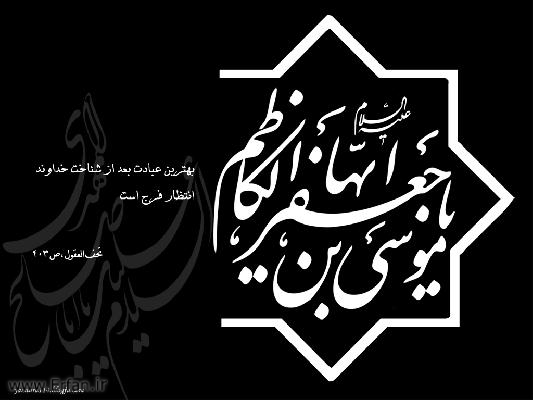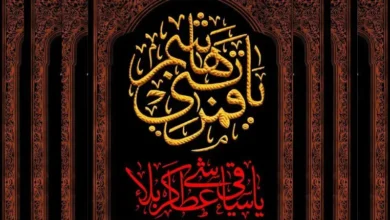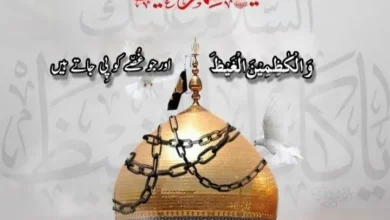Biography Of Imam Musa e Kazim as

Life Of Imam Musa e Kazim as
Musa e Kazim ,Musa ibn Ja’far al-Kazim (Peace be Upon him)
Name: Musa
Title: al-Kazim
Agnomen: Abu Ibrahim
Father’s name: Ja’far as-Sadiq
Mother’s name: Hamidah al-Barbariyyah
Birth: In Abwa’ (between Mecca and Medina) on Sunday, 7th Safar 128 AH
Death: Died at the age of 55, in Baghdad, on 25th Rajab 183 AH; poisoned by Harun ar-Rashid; buried in al-Kazimiyyah, Baghdad.
Kazim is his renowned title. In addition to the name “Abd-e-Saleh” (virtuous slave of God), he is known for his unparalleled devotion to God. His reputation became associated with generosity, and no beggar ever left his house without receiving aid.
He was kind and helpful to his followers even in death, when they came to his Holy Tomb with requests that God always seemed to grant. Because of this, he is also known as “Bab-e-Qaza-ul-Hawaij” (the key to obtaining desires).
Parents Of Imam Musa kazim :
The sixth Imam, Imam Jafar as-Sadiq (AS), was the father of the Holy Imam Moosa-e-Kazim (AS). His mother’s name was Hamida, and she was the daughter of an aristocratic Berber (now Algerian) man named Saed.
Birth:
Located halfway between Mecca and Medina, on the 7th of Safar 128 A.H., the Holy Imam was born in a town named Abwa.
Childhood:
Twenty of the most holy years of Imam Moosa-e-Kazim’s (AS) life spent under the protection of his Holy Father. His future personality was a product of his innate intelligence and endowed attributes, as well as the enlightened direction and instruction he received from the Holy Imam Jafar-as-Sadiq(AS). Even as a youngster, he had a complete understanding of all that the Godhead had to offer.
According to Allama Majlisi, Abu Hanifa once visited the holy house of Imam Jafar-as-Sadiq(AS) to consult with him on religious matters (Masail). He had to wait outside till the Imam woke up from his nap.
In the meantime, Abu Hanifa greeted the then-5-year-old Imam Moosa Kazim(AS) as he emerged from his home, and then he asked, “O the son of the Holy Prophet! I’m curious as to how you evaluate a man’s actions. Does God force him to perform things, or does he do them voluntarily?
The little Imam immediately responded in the style of his forefathers with, “O Abu Hanifa.” He was only five years old. There are only three options for what a guy can accomplish. To begin, they are something only God can accomplish and man can do very little about.
Second, the commitment shared equally by God and man. Lastly, he is alone responsible for them. If the first hypothesis is correct, then God is unfair because he punishes his creations for transgressions they did not commit. Even if the second stipulation holds, God would be unfair to punish man for sins for which he shared equal responsibility.
However, both of these are clearly undesirable when discussing God. That men are solely accountable for their actions is the third and last viable option, and it follows that this is the one we must adopt.
Imamat Of Imam Musa kazim as:
On 15 Rajab 148 A.H., the Abbasid caliph poisoned the Holy Imam Jafar-as-Sadiq(AS), and on the same day, Imam Moosa-e-Kazim(AS) became the seventh Imam. His Imamat lasted for a total of 35 years. Holy Imam Moosa Kazim (AS) was able to continue the spread of the teachings of the Holy Prophet (pbuh) in relative tranquillity during the first decade of his Imamat. But he quickly met his end at the hands of the monarchs in power and spent most of his life behind bars.
Al-Mufaddal b. Umar al-Jufi, Mu’adh b. Kathir, Abd al-Rahman b. al-Hajjaj, al-Fayd b. al-Mukhtar, Yaqub b. Abd al-Rahman, Mu’adh b. Kathir, al-Fayd b. al-Mukhtar, and Yaqub b
Both of his brothers, Ishaq and Ali, sons of Jafar, peace be on him, agree with this name. They were good and religious men, so they could be trusted as witnesses as long as two of them agreed on it.
[Musa al-Sayqal said that al-Mufaddal b. Umar al-Jufi, may God be merciful to him, said:]
(al-Mufaddal b. Umar al-Jufi) was with Abu Abd Allah (Jafar), peace be on him. Peace be on him, Abu Ibrahim Musa came in. He was just a kid. Abu Abd Allah Jafar, peace be on him, told him, “Tell the Companions you trust that Musa is in charge,” which means that Musa is in charge.
[Thubayt said, based on what Muadh b. Kathir said and what Abu Abd Allah Ja’far said:]
I (Muadh b. Kathir) told Jafar, “I ask God, who gave your father you for this job, to give you another of your children for the same job before you die.”
“That’s what God did,” he said.
I asked, “May I be your payment, who is it?”
He pointed me in the direction of al-Abd al-Sarh, also known as Musa e kazim. He was asleep.
He said, “This one who is sleeping.” He was a boy at the time.
Abu Ali al-Arrajani said that Abd al Rahman b. al Hajjaj said, “I (Abd al Rahman b. al Hajjaj) went to Jafar b. Muhammad’s house, peace be on them.” He was in his prayer room, which was a certain room in his house. He went there to pray. After he prayed, Musa e kazim b. Jafar, peace be on them, stood on his right.
“May God make me your payment,” I said. “You know how much my life has been devoted to you and how much I have done for you. Who is the wali al-amr (master of the affair) after you?”
“Abd al-Rahman,” he said, “Musa e kazim put on the armour, and it fit him.”
“After that, I don’t need anything else,” I said.
Abd al-Ala said that al-Fayd b. al-Mukhtar said, “I (al-Fayd b. al-Mukhtar) said to Abu ‘Abd Allah Ja’far, peace be on him, “Take my hand away from the fire (of Hell).” Who will be our Imam after you?”
Abu Ibrahim (Musa e kazim) came in. He was a boy at the time. Then Jafar told them, “This is your boss, or sahib. “Stay near him.”
Ibn Abi Najran said that al-Mansur b. Hazim said, “I (al-Mansur b. Hazim) said to Abu ‘Abd Allah, peace be on him, “May I pay you with my father and mother. Men are constantly coming and going around (the cycle). “If that’s true, then who is it?”
“If that’s true,” Abu ‘Abd Allah, peace be on him, said, “then he is your boss.”
He tapped Abu al-Hasan (Moses) on the right shoulder. I think he was about five years old at the time. “Abd Allah b. Ja’far was with us.
Ibn Abi Najran said, “Isa b. ‘Abd Allah b. Muhammad b. Umar b. Ali b. Abi Talib said that Abu Abd Allah Ja’far, peace be on him, said:”
I, ‘Isa ben Muhammad, asked Ja’far, “Who should I follow if something happened? May God keep me from seeing such a thing.”
(Ja’far) showed Musa e kazima, his son.
“Who should I follow if something were to happen to Musa e kazim?” I asked.
“His kid,” was the answer.
“What happened to his son, if anything?”
“His son came next.”
“What if something happened to him and he left behind an older brother and a young son?”
“His kid; it’s always been that way,” he said.
[Al-Fadl said, based on what Abu ‘Abd Allah Ja’far, peace be on him, told Tahir b. Muhammad,]’ I (i.e. Tahir b. Muhammad) saw (Ja’far) blaming his son, ‘Abd Allah, and warning him. He was asking, “What keeps you from being like your brother?” By God, I can see the light in (Musa e kazim’s) face.”
Abd Allah asked, “Why is that?” “Isn’t my father the same as his father? Aren’t my background and his background the same?”
“He is from my soul, and you are my son,” said Abu ‘Abd Allah Ja’far, peace be on him.
Ya’qub al-Sarraj told Muhammad b. Sinan: “I (Ya’qub al-Sarraj, peace be on him) went to see Abu ‘Abd Allah Jafar, peace be on him.” He was standing next to the head of Musa e kazim, son of Abu al-Hasan, who was in the cradle. He started playing with him and did so for a long time. I took a seat until he was done. I then stood up in front of him. He said, “Go up to your master (mawla) and say hello.”
I went up to him and said hello, and he answered in a very good way. Then he said, “Go change your daughter’s name from what you gave her yesterday. Because it’s a name God doesn’t like.”
I had a girl, and I had given her the name al-Humayra’.
Abu Abd Allah Jafar, peace be on him, told me, “Listen to the order he gave you.” So I gave her a new name.
[Ibn Miskan said that Sulayman b. Khalid said:] While we were with Abu Abd Allah Jafar, peace be on him, he called for Abu al-Hasan Musa. He told us, “It is your job to follow this man after me. He is your boss after me, swear to God.”
Ali b. al-Husayn said that Safwan al-Jammal said, “I (Safwan; al-Jammal) asked Abu Abd Allah Jafar, peace be on him, about the head of this affair (sahib al-amr) (after him). He said, “The person in charge of this is not someone who fools around.”
Peace be on him, Abu al-Hasan Musa came near. He was still very young. He had a calf that was going to Mecca, and he told it, “Bow down to your Lord.”
Abu Abd Allah Jafar, peace be on him, took him by the hand and hugged him, saying, “May I ransom with my father and mother (you) who do not fool and play.”
Ishaq b. Jafar al-Sadiq, peace be on him, told us: “One day, I was with my father, Jafar, when Ali b. Umar b. ‘Ali asked him, “May I be your ransom? Who will we and the people turn to after you?”
He said, “To the person who owns two yellow pieces of clothing and two locks of hair. Whoever is coming to you from the door.”
We didn’t have to wait long before we saw two (small) hands pulling on the two doors to open them. Abu Ibrahim Musa, peace be on him, came in before us. He was still a boy and wore two yellow pieces of clothing.
[Muhammad b. al-Walid said:] I heard Ali b. Jafar b. Muhammad al-Sadiq, peace be on them, say:
I (‘Ali b. Jafar) heard my father, Jafar b. Muhammad, peace be on them, say to a group of his closest friends and followers:
“Be kind to my son, Musa, peace be on him. He is the best of my children, and he is the one who will take over after I die. He is the one who will take my place (qa’im). He is God’s proof to all of God’s other creatures after me.”
Ali b. Jafar stayed true to his brother Musa, peace be on him, and was dedicated to him. He was also eager to learn about faith from him. In his popular book Masa’il (questions), he writes about the replies he heard from (Musa), peace be on him.
There are too many stories of what we’ve talked about to fully explain and describe them.
Imam Musa e Kazim’s Status in Politics:
When Imam Moosa-e-Kazim(AS) was alive, the dictatorial Abbasid rulers were at the height of their brutal and terrible rule. Mansur-e-Dawaniqi, Mahdi, and Haroon-al-Rashid were all kings he saw in power. Despotic monarchs like Mansur and Haroon killed many innocent people who were direct ancestors of the Holy Prophet (pbuh). During their lifetimes, many of these martyrs were imprisoned behind bars.
These Caliphs were heartless monsters who slaughtered and tortured people for the sick thrill of seeing them suffer.
To avoid victimizing the Holy Imam, King Mansur was too preoccupied with building the new city of Baghdad to pay any attention to the Holy Imam. Baghdad was founded in 157 AH. A year later, the company’s founder passed away. Mehdi, Mansur’s son, succeeded him as ruler when he died.
For several years, he showed no respect for the Holy Imam. His ancestral hatred for the Ahl-ul-Bayt(AS) was reignited when, in 164 A.H., he visited Medina and learned of the Holy Imam’s tremendous renown. He took the Holy Imam to Baghdad and successfully had him imprisoned there. But after a year, he admitted his error and the Holy Imam was freed from prison.
Hadi, who succeeded Caliph Mehdi, barely lived for a year. In 170 A.H., the most brutal and dictatorial ruler in Abbasid history, Haroon-al-Rashid, came to power. The Holy Imam was imprisoned for the majority of his life and ultimately slain during his reign.
The superiority of Imam Musa Kazim in Morals and Ethics:
The moral and ethical superiority of Imam Moosa-e-Kazim(AS) attested to by Ibne-Hajar’s observation that “the patience and forbearance of Imam Moosa-e-Kazim(AS) was such that the appellation of Al-Kazim (one who swallows down his rage). He personified decency and charity to a T. He spent his days and nights fasting and praying to God. The people who wronged him were always forgiven by him.
He had such a kind and giving nature that he would surreptitiously provide money, food, clothing, and other needs of life to the homeless and needy in Medina. The identity of the Imam’s donor remained a mystery to the recipients of his gifts throughout his lifetime, and it wasn’t until after his death that the truth finally emerged.
Successes of Imam Musa e Kazim in Literature:
Unlike his father, Imam Jafar as-Sadiq (AS), and grandfather, Imam Muhammad al-Baqir (AS), the Holy Imam Moosa-e-Kazim (AS) was unable to construct educational institutions to pass on religious knowledge to his people due to the constraints of time and circumstance.
There was never a church service at which he could speak. He quietly continued his work of preaching and assisting others. He also wrote a few works, the most well-known of which is the “Musnad of Imam Moosa-e-Kazim(AS).”
Martyrdom of Imam e Musa kazim (as)
King Haroon al-Rashid traveled to Medina in 179 A.H. Seeing the Holy Imam’s immense impact and popularity among the people there stoked the fire of hate and envy in his heart towards the Ahl-ul-Bayt. He had the Holy Imam arrested as he was praying at the Holy Prophet’s (p.b.u.h.) grave and held him for almost four years in a Baghdad prison.
He poisoned the Imam on the 25th of Rajab, AH 183. His body took from the prison and put on a Baghdad bridge as a last insult to his memory. However, his followers successfully buried the Imam’s Holy Body at Kazmain (Iraq).
Why Imam Musa Kazim Was Called Kazim?
Imam Musa e Kazim was born in 128 A.H. on the seventh day of the month of Safar. This day occurred in the month of Safar. His revered father was known as Imam Ja’far al-Sadiq, and the name Hamidah was given as the name of his illustrious mother.
In accordance with the order of God and the instructions given by the Prophet, the Holy Imam Ja’far al-Sadiq elevated his son to the position of Imamate and leadership and presented him to the people in this capacity. Holy Imam Musa al-Kazim was a guy known for his great wisdom and chastity.
His adoration and piety were so great that the name Al Abd Us-Salih translates to “God’s virtuous creature” or “servant.” His knowledge and wisdom were divine and celestial, and because of this, he was given this name.
He had an incredible amount of patience and forbearance, and he went through a lot of suffering in order to guide the people while also forgiving their mistakes and failings. If someone offend the Imam with their nasty behavior because of their ignorance, the Imam would stifle his wrath and try to guide that person with love and kindness instead of becoming angry with them. Because of this, people began to nickname him Kazim, which is an Arabic word that refers to someone who is able to control their wrath and refrain from fighting or using harsh language.
Holy Imam Musa al-Kazim was a resident of this earth for a total of 55 years throughout his lifetime. During the time that he served as Imam, in the year 183 A.H., on the twenty-fifth day of the month of Rajab, he was killed in Baghdad, and he was buried in the area adjacent to what is now known as “Kazimayn.”… May the grace and mercies of God always be showered upon him!
What Kind of a Lesson Did Imam Musa Kazim Give to That Man?
When Imam Musa e Kazim came into contact with Imam Musa e Kazim, despite the fact that he was a poor and ignorant farmer, he behaved in an unpleasant and harsh manner. He would make the Imam and his companions miserable on a daily basis by doing things that irritated them. Imam Musa al-Kazim did not respond to the man’s rudeness and abuses, but the Imam’s companions were prone to become very irritated and furious. Imam Musa al-Kazim did not respond to the man’s rudeness and abuses.
One day, when the rude guy was speaking harshly as he normally did, the Imam’s companions made the decision to punish him. They planned to inflict him so many blows that he would die and be silent for all time.
They voiced their agreement that “this man ought to suffer what he deserves for all of this nastiness.” When Imam Musa e Kazim learned of their plan, he forbade them and instructed their companions to “be patient. I shall show him how it’s done all by myself.”
The days passed, and that guy maintained his unacceptable behavior, which made the Imam’s companions anxious and uncomfortable. Each time they contemplated silencing him, the Imam rebuked them, saying, “My friends! Have patience, since I’m going to give him a lesson personally.” One day Imam Musa al-Kazim inquired.
“Where can I find him?” It explained to him that “outside of town, he is working on his farm.” Imam Musa e Kazim, rode out to the man’s property in order to visit with him. As soon as the man noticed the Imam, he planted his shovel on the ground and put his hands on his hips, signaling that he was getting ready to engage in further aggressive behavior.
Imam Musa e Kazim, as dismounted, walked towards him, cordially welcomed him, and then began their talk with an open expression and a smile on their face. “Don’t overwork yourself!” Imam cautioned. What a verdant and lovely country you own.
How much money, have you put into it thus far? The farmer, who taken aback by the Imam’s courtesy and honesty, addressed him in the following manner. “Roughly one hundred gold pieces,” the speaker said. Imam asked.
How much do you anticipate paid for this crop, considering all of the effort that you have put into its cultivation and the difficulties that you encountered along the way? The farmer thought for a short while before responding, “Roughly two hundred pieces of gold.” Imam (A.S.) pulled out a bag and handed it to the farmer, telling him, “Within this bag are three hundred gold pieces, which is greater than the worth of your produce.”
Take it, the harvest is also yours, and I wish you would receive greater compensation for it,” The farmer, who in spite of all the poor manners and abuse he received, exposed to such amazing behavior and lovely ethics, and as a result, he felt tremendous guilt. He spoke in a weak and shaking voice as he said, “I was wrong to abuse you.
You, on the other hand, are a wonderful guy and the son of a great man, and you have been kind to me and have assisted me in many ways. I beg your pardon… please.
After that, the Imam bade, him farewell and headed back to Medina after only a few brief words of conversation. After that, the farmer would always greet the Imam with politeness whenever he met him, treat the Imam and his companions with respect, and remark that “God knows best who to install as Imam and Guide of the people.”
It’s possible that they were unaware of the manner in which the Imam Musa e Kazim had instructed him.




